
A career in sports management is exciting and fulfilling — and can be very lucrative if you work hard and always keep at least one step ahead of the competition. Getting that much-sought-after career is up to you, and creating a powerful sports management resume is a critical component to your success.
In this Ultimate Guide to Creating a Powerful Sports Management Resume, you will get a comprehensive action plan that includes sports management resume examples, sample cover letter content for sports management internships, where to apply for jobs, and much more.
Before you get started, it’s important to not only get insight into who you are and what skill sets, education, and experience you have which will help you land a job, but also gain clarity on both your short and long-term career goals.
Chapter 1
Planning your career in sports management
Who do you want to be in the wide world of sports?
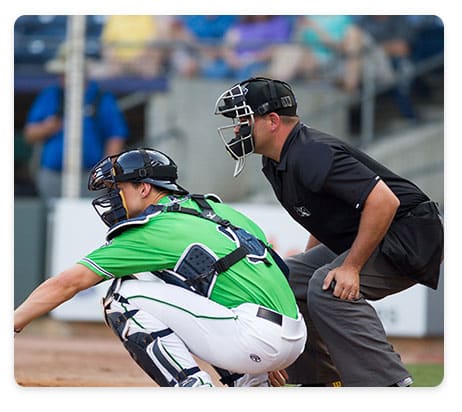
Sports management is a “catch-all” term. It encompasses a wide variety of professions within the wide world of sports. Who do you want to be? From Ballpark Operations to Accounting and Coaching to Data Analysis, you have a virtual smorgasbord of choices. Where you fit in is up to you.
For a list of all of the sports management job opportunities available, check out the Ultimate List of Careers in Sports Management.
What skill sets, education, and experience do you have?
Are you a great communicator? You might be an excellent PR person. Do you excel in a particular sport? A coach or assistant coach may be right up your alley. Whether you are looking to land a sports management internship or are ready for a full-time position, your personal skill sets, education, and experience will all factor into the type of sports management job you will be able to obtain.
Think big picture here and gather all the information together prior to sitting down to compose your resume. A little planning goes a long way to make a resume shine.
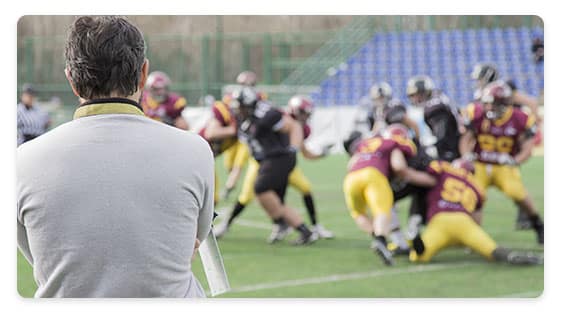

What are your short and long-term goals?
Think seriously about this before creating your sports management resume. Understanding (or at least having an idea) about your short and long-term goals will help to develop the targeted language you need to draft a dynamic resume. Are you hoping to intern for your favorite baseball or football team? Would you like to one day be the operations manager of their ball field or stadium?
Be bold. Your success in sports management is up to you and the hard work you’re willing to put into it. It starts with selling yourself in the right way. That’s what resumes are for! Your short and long-term goals may evolve over time, but knowing the next steps to take to get what you want now will propel you throughout your career.
Onward and upward
In the next section, you will find out what you need to include in a sports management resume to make it truly powerful and capture the attention of recruiters, hiring managers, and other industry professionals. Are you ready to jumpstart your career in sports management? Let’s get started.
Chapter 2
Creating a sports management resume
Your resume is a personal showcase of your knowledge, skills, and abilities. It should be direct and grab the attention of the reader right away. Not all sports management resumes are treated alike, though. Customizing the document to the type of job and organization you want to work for is central to getting that first contact.
Have you reviewed the job descriptions of the job titles you plan to apply for? Before creating your sports management resume, review five or more to get a good feel for what they’re looking for as an ideal candidate. Then, you can have that in your tool belt before moving forward. Always tell the truth and emphasize the knowledge, skills, and abilities you have that would “wow” recruiters and managers.
Choose your format
The two primary formats for sports management resumes are:
1. Chronological format: lists all of your work history in the exact sequential order that the jobs occurred.
2. Functional format: places emphasis on your skills but also lists your experiences.
The components of a powerful resume include:
-
- Objective/Summary statement — typically placed at the top of the resume and includes your goals of employment. It is usually one or two sentences long and is tailored to the type of job you are applying for.
-
- Educational information — including any degrees or certifications
-
- Past employers/Leadership — a detailed, chronological listing of your previous employers including job title, dates, responsibilities, and accomplishments; related leadership experience
-
- Skills & abilities — if you’re just starting out, this section can be emphasized just below the objective statement; with any past employers or internships placed toward the bottom of the resume
Since the sports industry is very results-oriented, presenting how your particular skills and abilities can create results is essential to attract the attention of recruiters and hiring managers. Are you very organized and good at managing projects? Do you have excellent coaching and motivational skills? Explain clearly how your unique skills can make great things happen.
Highlight your experience
Yes, it is necessary to describe what you can do for an organization — but to help you truly rise above the competition, make sure to include any relatable previous experiences. Think critically about this. Particularly if you are at the beginning of your career, you need to highlight any internships, volunteer positions, and summer jobs using powerful action verbs. Include key accomplishments showcasing results.

Avoid passive phrases like “I did” or “I worked on.” Instead, use dynamic verbs such as:
- Strengthened, Increased, Motivated
- Initiated, Executed, Implemented
- Supervised, Directed, Oversaw
Language matters. Using these types or verbs conveys a positive impression, bringing the things you have accomplished and performed into a real “winning” conversation.
A note to those who are just launching your sports management careers: it’s okay if you don’t have a lot to place in the experience section. Just make sure that the experience you do have is conveyed in the most powerful way you can. Often skills that you obtain in non-sports related jobs or volunteer experience can be considered “transferable” and can include anything from creating reports, being a group leader, and organizing and executing events.
Chapter 3
Sports management resume best practices
It is critical to understand some best practices before creating a sports management resume. Some of these may seem pretty “standard,” but having them at the forefront of your mind before you start will help prevent costly mistakes.
Here are 7 best practices for sports management resumes
- 1. Be honest. Don’t lie on your resume.
- 2. Use 11 or 12 point text — and don’t use weird fonts. Choose Times New Roman or Arial.
- 3. Use bullet points, bolded words, and indentations for the most important information.
- 3. Recent graduates should only have 1 page. Other job-seekers: a maximum of 2 pages.
- 4. Don’t place any personal information such as marital status or age on your resume.
- 5. Don’t place references directly on the document.
- 6. Always accompany your resume with a cover letter.
- 7. Proofread relentlessly. Go over it at least 3 times. Errors on resumes are unprofessional.
Questions? Jobs in Sports has proven expertise in creating powerful sports management resumes that increase your odds of getting a call.
Chapter 4
Examples of great sports management resumes
Knowing the components of a resume, as well as best practices, gives you the resources to get the job done. Just like in acquiring a skill or becoming an expert in a particular sport — it always helps to visualize what you are striving to achieve.
Let’s break down the sections of two great sports management resumes. The first one (A) is for a new graduate entering the job market or seeking an internship. The second one (B) is for an individual with some experience looking to make the next big move in his/her career.
Objective/summary
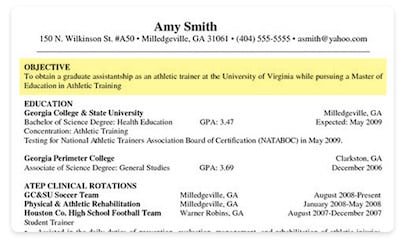
(A) Skilled content strategist and communications specialist with a track record of strong leadership. Results-oriented creative-thinker with a passion for dynamic branding across digital and traditional media. Seeking opportunity in content production for sports media.
(B) Experienced Baseball Coach with a consistent, winning track record. Team leader dedicated to collaborative clubhouse environment. Seeking opportunity at the NCAA level.
This section emphasizes top qualities and gives clarity about intentions.
Skills & abilities
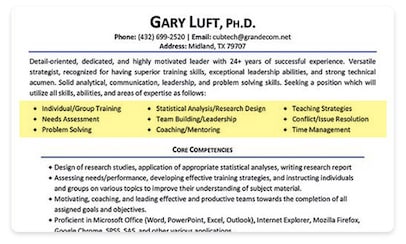
(A) Creative Thinker, Problem-Solving, Team Leader, Multimedia Production, Adobe Edit Suite, Social Media, Advertising, Adobe Suite, Communications, AVID Media Composer
(B) Sports Team Management, Athletics, Strong Organizational & Interpersonal Skills, Budgeting, Equipment Management, Game Preparation, Field Player Instruction, Leadership Development
Be very targeted with your skills and abilities section. The most common titles for this section are Skills, Highlights, and Proficiencies. These are usually placed at the top just below the objective statement.
Education
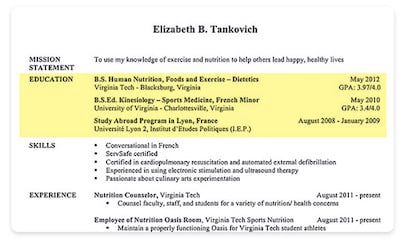
(A) Boston University, Boston, MA
Bachelor of Science in Communications
Emphasis: New Media, May 2018
(B) The University of North Carolina at Chapel Hill
Bachelor of Arts in Exercise and Sport Science
Focus: Athletic Training
It is important to mention any specific emphasis in your studies related to your job search.
Coursework
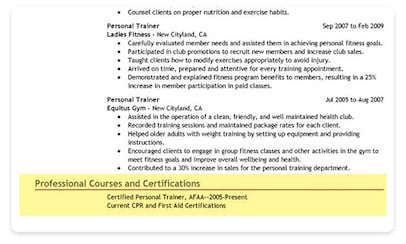
(A) Introduction to Advertising, Principles & Practices of Public Relations Design & New Media, Design & New Media II, Writing for Multimedia, Design & Interactive Experiences
You don’t have to list everything — just the ones most relevant to your search. If it has been more than 4-5 years since graduation, you don’t need to necessarily list your coursework.
Leadership/Projects or Past Employers
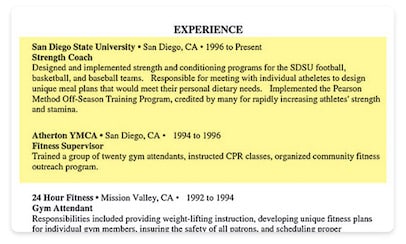
(A) Boston University College Media Center
Project Lead: Selected to lead 6-month Multimedia project in content production for mock Patriot League events with a focus on social media. Extensive Adobe suite utilization. Led team of five in development, design, and presentation to media center professionals.
(B) Durham High School
Head Baseball Coach (2014-Present)
Leading coaching of successful high school baseball team, coordinating and leading all practices and games and facilitating sportsmanship. Driving winning mindset for clubhouse and targeting opportunities for individual growth.
-
-
- .687-.700 winning percentage each year
- Awarded Durham County “Coach of the Year” – 2017 & 2018
- Reached NCHSAA State Playoffs Finals 2017 & 2018
-
Both of these highlight key areas that recruiters would be looking for: skills, leadership, and results.
Whether you are just starting out or seeking to advance to the next level of your career, telling your business story effectively by showcasing why you would be the ideal candidate for a particular position is critical to getting that call. Need help? Find out more here.
Chapter 5
How to write a cover letter
The cover letter is a document that helps to enhance your chances when you are applying for a job or sports management internship. It’s an important step that should not be overlooked or carelessly composed. It should not be just a letter saying “here is my resume for the position of …” It should be personalized and well thought out to perform well and get the attention of the recruiter or hiring manager.
Maintain good form
Cover letters should be only one page, using a standard font like Times New Roman or Calibri (size 12), and should not repeat items on your resume unless you are expanding them.
Demonstrate your passion
Anyone can say they are passionate about sports. Why would you pursue a career in it if you’re not? Prove your passion with examples. Did you volunteer in a community league on the weekends? Where has your passion led you?
A sample cover letter for sports management internship may include a statement like:
-
-
- Deeply involved in baseball since I hit my first home run, my passion for the sport has driven me to volunteer at the community league level every summer from the age of 15-21, working part-time as an usher with the Atlanta Braves for the last two seasons, and helping to promote my high school team, the Bremen Blue Devils, on various social media platforms to increase turnout and support the school.
-
Give at least one example of results
Expand at least one accomplishment on your resume — but be precise. For example, if you organized a special event, give details:
-
-
- For the 2017 Carroll County Youth League Championships, I researched and provided a comprehensive list of vendors, solicited more than 20 volunteers, and developed and executed social media promotions strategy — resulting in a cost-savings of over $2,000 and garnering additional funds for next year’s tournaments.
-
Highlight experience & skills
If you have experience directly related to the job you are applying for, be direct. An example if you are applying for a head coach position:
-
-
- With five years of experience as Assistant Baseball Coach at Baltimore High School, I delivered leadership in team management and strategy that propelled winning seasons every year and two regional championships.
-
Or if you’re just trying to enter the job market:
-
-
- I’m proficient in the full suite of Adobe editing programs and Avid Media Composer. I also understand the power of SEO and the user experience in reaching new audiences and raising sports brand awareness.
-
Include any direct contacts
Did you meet the person you are writing to at an industry event? Are you acquainted with someone in the organization that let you know about the job or internship opening? If you have any contacts, use them. Acquiring connections is a good reason to participate in special industry events, trade shows, etc. You never know who you are going to meet that can help accelerate your career. Network! And utilize that information in your cover letter when you can.
Proofread and include all contact information
Just like your resume — proofread, proofread, proofread! Your valiant efforts can be dashed with simple mistakes such as using “to” when you meant “too” or misspell the name of the job title you are applying for. When you close the letter, state the job title and thank them for considering your application. Courtesy matters.
Also, make sure to include all pertinent contact information too. You want to make it as easy as possible for them to connect with you. Do you have a big Twitter or Instagram following? If you have a large social media following, and your content is in alignment with your “brand,” include that too. You know they will be googling you anyway, right?
Create a general sample for your cover letter for sports management internship and let people you trust review it. It’s always great to have a second opinion before you send it to a person that could change your life!
Chapter 6
Sending out your resume
Once you have your resume completed, you’re ready to take the next step. There are many things to think about here. Are you willing to relocate? That will increase your opportunities significantly. Are you ready for a full-time job or do you need to get some experience with an internship? Depending on your skills and experience, you may be able to apply for both types of opportunities. Try not to limit yourself too much if you are just getting going with your career.


Do you know America’s most up-to-date job board? Jobs in Sports. You can find the very latest jobs available in the sports industry. Here are the comprehensive categories that Jobs in Sports covers:

You can filter by category and by region. Some individuals may be able to search in more than one category. For example, if you have a business degree, you could search in Sports Management Administration and Collegiate & High School Sports Administration. You may also qualify for jobs in Sports Sales, or even other categories depending on the position.
Jobs in Sports also highlights the most recently posted jobs as well as featured internships, featured jobs, and gives you the latest news in sports to make sure you are in the know regarding what is relevant right now.
At Jobs in Sports, you can have unlimited searches and applications to make that career move you’re ready for. Once you find one or more to apply for, edit your cover letter template so the language is specific to the particular job and contact. Then, send in your resume, cover letter, and application together.
An essential element of landing that job or internship is organization. Keep track of the applications so you don’t let any opportunities fall through the cracks. Follow-ups are your friend. Note the date you sent your resume and the time frame (if one is listed) for the open period for the job. If you haven’t heard anything within two weeks of the closing date, follow up with the contact on the application.
If you obtain an interview for the job or internship — congratulations! You’re one step closer. Prepare well and do your best and make sure to follow up with them after the interview and thank them. Again — courtesy matters and is another way you can stand out from the competition.
Jobs in Sports offers a Premium Membership that gives you many benefits to help you land that dream job or internship. These include:
- Hiring Manager Contact Information
- Direct Apply
- Job Category Preferences for efficient job searches
- Complete Job Descriptions
- Resume Uploads
- “My Jobs” folder to help you keep track of your applications
- Search Team Contacts Database
- Game Face Audio Series
- Sports News You Can Use
- Unlimited Sports Job Database Searches
Don’t forget! Jobs in Sports also offers professional resume and cover letter services too. Providing a personalized business story backed by proven expertise, our partners have learned exactly how to format and optimize a resume that both gets through the ATS and captures the attention of hiring managers. When you apply for a job online, you have one chance to make a powerful and positive impression.
On your mark…get set…go!
Are you ready to make your career move in sports management? As America’s Premier Sports Job Board, we have been helping people just like you for 16 years. We help to shorten sports job searches for people looking in all the diverse categories that the world of sports has to offer.
With this Ultimate Guide to Creating a Powerful Sports Management Resume, an exciting and fulfilling career in sports management is within reach. Utilizing all the resources you need to get that first contact and land that job or internship is a smart move to get you started. On your mark…get set…go!





